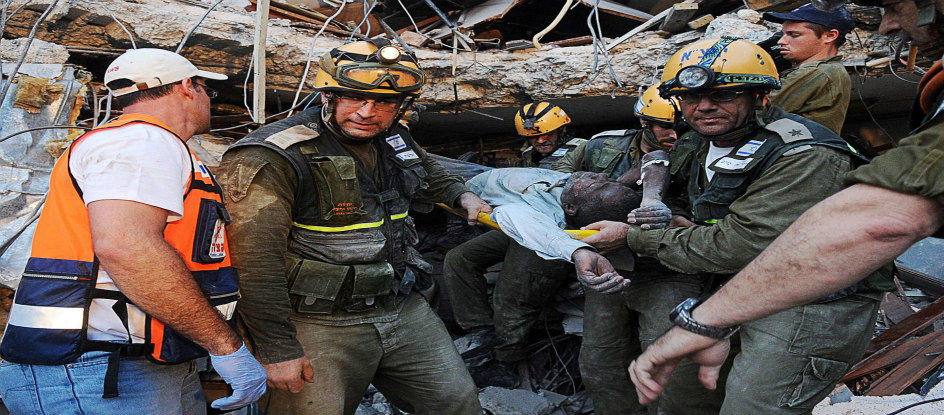Though a First Responder to countries in need for over 30 years now, utilizing knowledge gained from tragedies experienced here to ease the suffering of disaster victims the world over, Israel’s humanitarian efforts are still judged through a political prism.

There is a profound irony to the fact that the Jewish people – so helpless and alone against Nazi persecution only little more than 70 years ago – is almost always first to respond to disasters around the world. In the past 30 days alone, Israel has sent aid teams to Houston, Florida, the Caribbean, and Mexico.
In Texas and Florida a multitude of Israeli NGOs – Dream Doctors, ZAKA, IsraAID, Magen David Adom, Jewish Agency, United Hatzalah/Israel Rescue Coalition among them – have sent relief teams to help hurricane victims. In fact, tiny Israel was among the first to send a team to Houston after hurricane Harvey hit. In contrast, the European Union limited its assistance to providing satellite maps. The Israeli rescue team to Mexico consists of an IDF delegation of 70 soldiers, 25 of whom are engineers, who will evaluate the damage and provide assistance in the disaster area. They were met with cheers when they arrived in Mexico.
Few people outside of Israel know that the Jewish state has been a first responder on the international scene – aiding victims of both natural and man-made disasters – since the 1980s. Among the major early operations were IDF rescue missions to Mexico City after earthquakes destroyed thousands of buildings in September 1985, earthquake relief in Armenia in 1988 and an IDF medical team – along with 270 IDF soldiers – sent to provide medical and humanitarian aid to refugees from the genocide in Rwanda in 1994.
Israel has offered its help indiscriminately to all countries – even disregarding their hostility to Israel – including those countries with whom it has no diplomatic relations. In 2003, an earthquake in southeastern Iran killed more than 26,000 people, but when unofficial Israeli sources considered offering aid, a spokesman for Tehran’s Interior Ministry said that Iran would accept “…all kinds of humanitarian aid from all countries and international organizations with the exception of the Zionist regime”.
In addition to the Iranian attitude, there those who accusingly claim that Israel only engages with disasters in order to curry international favor. This is usually leveled by the same types who nurture an obsessive-compulsive disorder when it comes to bashing Israel. However, in reality Israel scores preciously few points on the PR scale for its disproportionately high involvement in international rescue missions. In 2015, for example, when Israel sent the second-largest medical and rescue team to help after the devastating Nepal earthquake – over 250 medical and rescue personnel together with a field hospital that treated over 1000 patients, conducted 85 operations on injured Nepalese civilians, and delivered eight babies – most international media outlets simply pretended the Israeli rescue mission never happened.
The media reaction – or rather lack of it – made sense, in a twisted sort of manner, because reporting on the amazing Israeli rescue mission to Nepal would disrupt the false narrative of ‘apartheid’ and ‘occupation’ to which most of the international media subscribes. Others found it difficult to ignore the rescue mission altogether, but they did not let it interfere with their ill-concealed animosity to Israel. Kenneth Roth, executive director of Human Rights Watch, resorted to conspiracy theories, when faced with his own compulsive inability to leave Israel alone: “Easier to address a far-away humanitarian disaster than the nearby one of Israel’s making in nearby Gaza. End the blockade!” tweeted Roth. Ken Roth did not share his opinions about the rescue efforts of other countries, nor did he mention the notably absent Iranian or Saudi rescue teams.
However, despite efforts to ignore or denigrate Israel’s international rescue efforts, the latter are in fact both noticed and appreciated by the world community. In November 2016, the UN – the organization most famous for condemning Israel at every possible and especially impossible occasion – recognized the Israeli army’s field hospital, which is regularly sent abroad to provide aid, as “the number one in the world”. The World Health Organization (WHO), a UN organization which spends a lot of time singling out Israel for imaginary crimes, including being the world’s only violator of ‘mental, physical and environmental health’ experienced a rare moment of lucid rationality and actually recognized Israel for its accomplishments. The IDF field hospital was classified according to a set of criteria that WHO created in 2013, which are used to classify foreign medical teams in sudden onset disasters, on a scale from one to three. Israel is the only country in the world to receive the top mark.
It is of course nice that even the UN is able to recognize the good that Israel does in the world, but Israel was involved in rescue missions around the worlds for decades, while all it received in return was international condemnation. Israel will continue to do good in the world, because Israelis love and celebrate life and because pikuach nefesh – the idea that a person must do everything in their power to save the life of another – is strong and very much alive in Israel. Israel’s missions abroad are a natural reflection of that.
Judith Bergman is a columnist and political analyst



